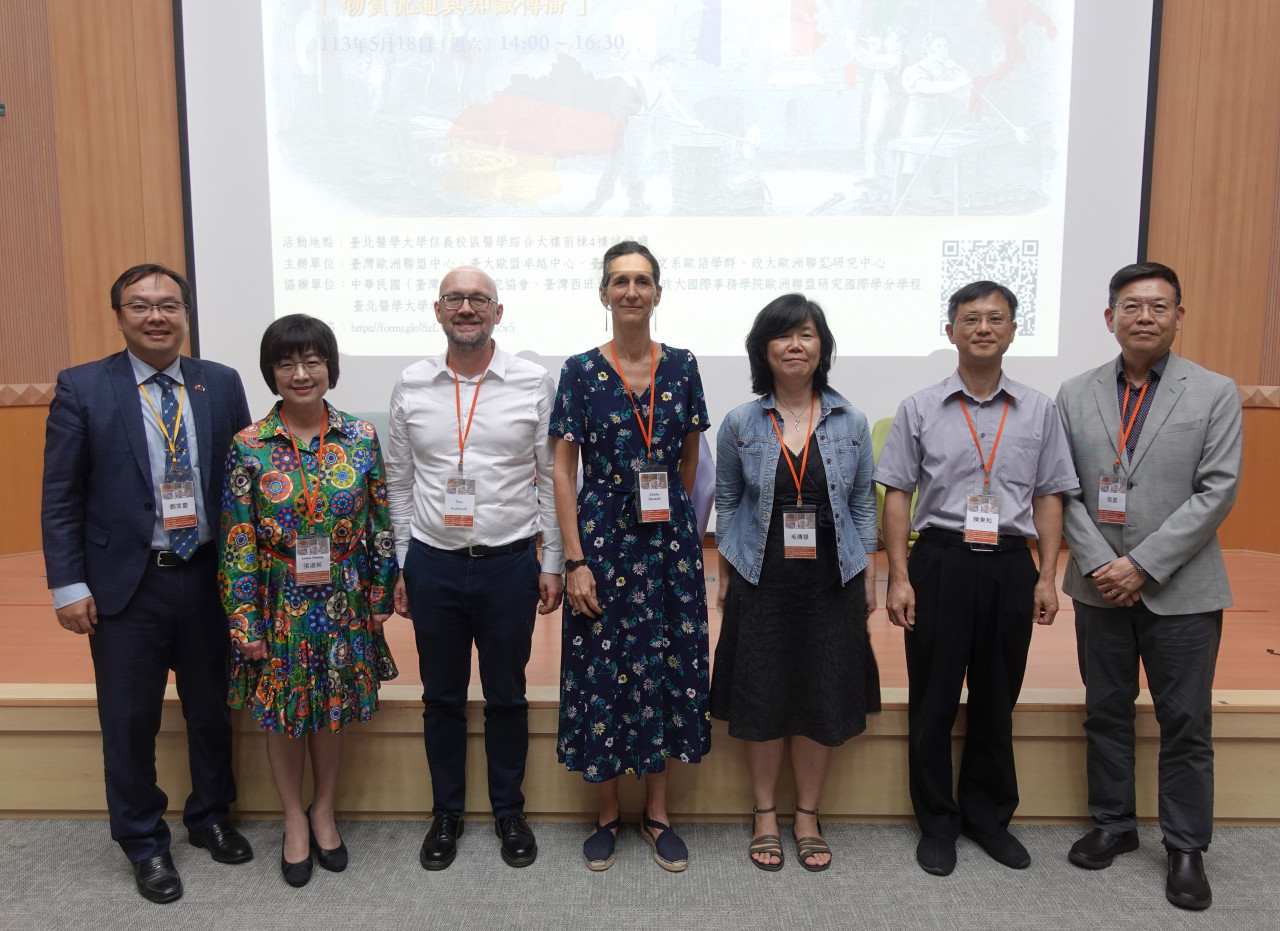The 30th Taiwan European Cultural Forum, organized by the European Union Centre in Taiwan, was held on 18 May 2024 at Taipei Medical University. The forum spotlighted on the rich history of technological and artistic exchange of material civilization between the East and the West, highlighting the remarkable techniques and knowledge dissemination in glass craftsmanship, sericulture, and chemistry from Italy, France, and Germany between the 17th and 19th centuries.
The event began with a speech by Ms. Cécile Renault, Head of culture, university cooperation and education of the French office in Taipei. She shared her views on cultural diplomacy and introduced recent initiatives by the French Office in Taipei, such as Villa Formose, to promote cultural cooperation between Taiwan and France. Afterward, Mr. Timo Kozlowski, Deputy Director of the Goethe-Institute Taipei took the stage to deliver a speech. He highlighted that the cultural exchanges discussed today marked an important era in history. In the current global context, the importance of knowledge sharing and cultural exchange has never been greater.
Subsequently, Luisa Chang, convener of the forum and a professor secondment from the Department of Foreign Languages and Literature at National Taiwan University to Taipei Medical University, pointed out that the purpose of this forum was to promote the increasingly important values of Diversity, Equity, and Inclusion (DEI), encouraging faculty and students to broaden their horizons and learn different languages and cultures. Afterward, the Executive Director of European Union Center in Taiwan, Mr. Marc Cheng, indicated that the largest European community in Taiwan is centered around in the cultural sector, making the hosting of such forums particularly meaningful. Taiwan European Cultural Forum is especially noteworthy as it will celebrate its 10th anniversary this year. He expressed his gratitude to Professors Chang and Mau for their contributions and emphasized that they had spent nearly two years preparing for this forum.
The forum invited three expert scholars as keynote speakers: Associate Research Fellow Dong-He Chen from the Department of Registration and Conservation at the National Palace Museum, Department Chairperson & Professor Chuan-Hui Mau from the Institute of History at National Tsing Hua University, and Professor Hao Chang from the Center for General Education at I-Shou University. They each discusssed the contributions of Italy, France, and Germany to the development of modern material civilization from the perspective of the history of science and technology.
Associate Research Fellow Dong-He Chen first introduced the history of aventurine glass. Accidentally created in 17th-century Murano, Venice, its main feature is the countless golden metallic particles scattered throughout the opaque reddish-brown glass. The production process is complex, making it highly valuable and popular among European court and the upper class during the 18th and 19th centuries. Meanwhile, in the 35th years of Kangxi Emperor (1696), under the guidance of Father Kilian Stumpf, China began experimenting with the production of this glass, successfully creating it in 1741 during the Qianlong period. This glass later became popular in the Qing court, featuring an artistic style distinct from European aventurine glass.
Professor Chuan-Hui Mau then introduced the development of "la chinoiserie" and the modern French sericulture industry. The term "la chinoiserie" first appeared in 1836 in the novels of Honoré de Balzac, but its emergence was not accidental. With the beginning of the Age of Exploration, reports from missionaries and goods introduced through maritime trade sparked a fascination with Chinese decorative styles. Compared to architecture and painting, "la chinoiserie" had a more lasting influence on silk fabrics. In the late 17th century, Louis XIV emulated the Qing court’s practice of ordering silk fabrics from the Three Silk Weavers, promoting the popularity of textile apparel, and gradually bringing the French sericulture industry to its peak. From the second half of the 18th century, more experiments and styles were carried out with reference to Chinese sericulture literature, and finally in the first half of the nineteenth century, the France sericulture school was developed that surpassed the sericulture industry in Italy.
Professor Hao Chang presented on the dissemination of Western chemical knowledge to the East during the late Qing Dynasty and the prominent role of German chemists at that time. He noted that three works – “Treaties on Quantitative Chemical Analysis”, “Qualitative Chemical Analysis”, and “Quantitative Chemical Analysis” – translated by Anatole Billequin, John Fryer, and Shiu Shou at the Tongwen Guan in Beijing, based on the works of Karl Remigius Fresenius, the introduction of Western chemical knowledge reached its peak in the late Qing China. Fresenius was a student of Justus von Liebig, whose contributions significantly propelled Germany to become a global leader in chemistry during the first half of the 19th century. Liebig not only conducted pioneering research in the field but also established a chemical teaching laboratory at Justus Liebig University Gießen, which became a model emulated worldwide.
After the presentations, the audience responded enthusiastically, asking highly professional questions that involved many technical details. The speakers, with their vast knowledge, patiently provided in-depth answers, further enriching the audience’s understanding of the forum’s topics. The discussions between the audience and speakers even extended beyond science and history to the realm of education systems. In concluding the forum, Professor Luisa Chang emphasized that the forum allowed us to discover others and understand ourselves, and that the divergent developments of material civilization after spreading from their places of origin are questions worth pondering. She also encouraged holding more sessions on this topic if the audience found it worth exploring further.
The next Taiwan European Cultural Forum will take place at National Taiwan University, where we’ll have the pleasure of welcoming the new Head of the EU Representative to Taiwan to join. We invite both long-time attendees and newcomers to join us. Future sessions will continue at Taipei Medical University, and we look forward to the ongoing support from TMU’s faculty and students.


Social links